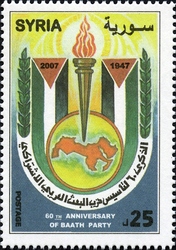Archive for December 2009
Two Stages of the Syrian Ba’ath
Again inspired by Hanna Batatu’s excellent book, here are some notes on the first two of the three stages of the Ba’ath Party in Syria. I haven’t mentioned the party’s development in Iraq.
The first Ba’ath was the old Ba’ath, and it was led by ideals. The party’s founders, Michel Aflaq (a Christian) and the two Bitars (Sunnis) were the sons of grain merchants from the Damascus suburb of Maydan, and were genuinely motivated by the desire for a unified Arab state. They were of the commercial class that felt most immediately the loss of the natural Arab marketplace entailed by the Sykes-Picot partition and the actions of the French Mandate. The French had ceded Arab-majority areas north of Aleppo to Turkey, and in 1939 handed over the entire Iskenderoon governorate (which had an Arab and Alawi majority) in return for Turkish neutrality in the approaching European war. From 1925 to 26 the Druze had risen against the French under the anti-sectarian slogan ‘Religion is for God and the Homeland For All.’ The Ghuta peasant-gardeners, aflame with the nationalism of nearby Damascus, also struck, and the French bombarded the Ghuta with artillery and planes. The 1948 fall of Palestine added impetus to the pan-nationalist agenda. Sunnis from Deir ez-Zor, now cut off from their kinsmen and marketplaces in Iraq, were also attracted to Arabism.
Before it became a party of policemen and bureaucrats the Ba’ath was a party of schoolteachers (the leadership) and schoolboys (the mass membership). Pedagogic aims run deep in the Ba’ath’s family history. The subject of instruction at this stage was an unfeasibly romantic vision of the Arabs, something beyond the traditional nationalist picture of the Arabs as a people united by language and culture, in other words by historical forces. The Ba’ath saw the Arabs as a nation outide history, as an eternal creative force and unified will (Henri Bergson’s philosophy was important), and Ba’athist rhetoric transported spiritual language into nationalist discourse. Umma Arabiya Wahida, goes the slogan, Zat Risala Khalida. Or One Arab Nation Bearing an Eternal Message. Umma hitherto referred to the Islamic community, not the Arabs, and Risala is the word used for God’s message transmitted by Muhammad, the Rasool. Like Zionism, Stalinism, fascism and hedonist-consumerism, the Ba’ath was one of the 20th Century’s attempts to secularise and channel people’s religious impulses, to provide a substitute for the crumbling or crumbled traditional religions.



